
The law in relation to those lacking capacity has undergone radical change: is the Begum case still fit for purpose? Brooke Lyne investigates
- Since the decision in the Begum case in 1993, there has been a huge shift in the way the law treats those lacking mental capacity.
- In WB v W District Council the Court of Appeal was forced to consider whether the Begum principles were still relevant.
Under Part VII of the Housing Act 1996 (HA 1996), local authorities have a duty to secure accommodation for those who are eligible, in priority need and not intentionally homeless. There are a number of categories of ‘priority need’ but for current purposes a person who is ‘vulnerable as a result of old age, mental illness or handicap or physical disability or other special reason’ has a priority need.
The Begum case
The starting point when considering mental capacity in homelessness law is the case of Begum (reported as R v Oldham Metropolitan Council ex parte Garlick [1993] AC 509, (1993) 25 HLR 319, [1993] 2 All ER 65), which was decided under the preceding homelessness











